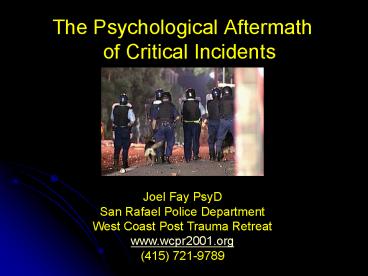The Psychological Aftermath of Critical Incidents - PowerPoint PPT Presentation
1 / 40
Title:
The Psychological Aftermath of Critical Incidents
Description:
Thalamus Routes information from eyes and ears to the brain. Amygdala ... Spleen increases red blood cells into bloodstream to promote oxygen supply. ... – PowerPoint PPT presentation
Number of Views:43
Avg rating:3.0/5.0
Title: The Psychological Aftermath of Critical Incidents
1
- The Psychological Aftermath of Critical Incidents
Joel Fay PsyDSan Rafael Police DepartmentWest
Coast Post Trauma Retreatwww.wcpr2001.org(415)
721-9789
2
One Way of Understanding the Brain
Cortical Brain
Limbic Brain
Reptilian Brain
3
Cortical BrainConscious Thought / Action /
Planning.
Spoken and/or written language.
PlanningOrganizing, Problem SolvingSelective
Attention Personality Behavior
Visual
Memory
4
Limbic System External World / Internal Response
- Controls Emotions
- Emotional Responses
- Hormonal Secretions
- Mood
- Motivation
- Pain and Pleasure Sensations
No language involved / necessaryin Limbic system
responses
5
Reptilian Brain Physical Response.
- Controls the body'smost basic functions such as
heartbeat and breathing
6
How It Works
- Thalamus is a routing station for all incoming
sensory impulses except smell
7
How It Works
- Thalamus Routes information from eyes and ears
to the brain
8
Amygdala
- Small almond shaped structure near the middle of
the brain. - Attaches meaning to memory
- Places the experience into the context of an
emotion.
9
- The Amygdala is the command center of the
brains fear system.
10
- A rat lacking an Amygdala will not respond to
a threat.
11
The absence of fear is not courage the absence
of fear is some kind of brain damage. M.
Scott Beck
12
When the Amygdala goes on the Pre-Frontal Cortex
goes off
13
Brains Response
- Prefrontal Cortex Reins the Amygdala is the
threat is deemed to be insignificant.
14
HippocampusResponse
- Evaluates threats by placing them in the context
of a previous experience.
15
What Happens Next?
- Amygdala If threat is sufficient the body shuts
down non-emergency services (I.e., digestion and
immunity) - Triggers body wide emergency response within
seconds
16
Hypothalamic-Pituitary-Adrenal System (HPA)
- Release of Cortisol to activate the bodies
defense systems - Release of Catecholamines - dopamine,
norepinephrine, and epinephrine
17
Catecholamines
- Suppress activity in areas at the front of the
brain concerned with short-term memory,
concentration, inhibition, and rational thought.
- This allows a quick reaction to the threat
18
Response
- Heart and lungs receive a glucose dump
19
Hearts Response
- Heart rate and blood pressure increase
instantaneously - Blood flow may actually increase 300 to 400
20
Skin's Response
- Diverts blood flow away from the skin to support
the heart and muscle tissues - This causes cool, clammy, sweaty skin
21
Circulatory Response
- Spleen increases red blood cells into bloodstream
to promote oxygen supply. - As blood moves into muscles, blood vessels
tighten causing vasoconstriction.
22
Immune System's Response
- Infection fighting systems (white blood cells,
etc) are redistributed - Immunity boosting agents are sent to the skin,
bone marrow and lymph nodes
23
Mouth and Throat Response
- Fluids are diverted from nonessential locations,
including the mouth - Can make it difficult to talk.
24
- Heightened alertness in the brain which in
effect tells the memory centers, - Remember what occurred.
25
What is Memory?
- The use of past experiences to affect future
behavior.
26
- We use memory to anticipate the future It is
how we stay alive.
27
So, the really cool thing is
- All of this occurs in a couple of seconds or
less
28
What Do All These Chemicals and Hard Wired
Reactions Mean To Me?
So You Might Ask
29
Post Traumatic Stress Disorder An Assault on
the Mind, Body and Spirit
30
PTSD
- PTSD is a total person experience
- Symptoms effect
- Mental Health
- Physical Health
- Family and Friends
- Work
- Spirit
31
PTSD Diagnostic Criteria
- Must be exposed to a traumatic event
Person's response to the event must involve
intense fear, helplessness, or horror
32
The event must be re-experienced by distressing
recollections, dreams, flashbacks, etc.
33
Avoidance of locations, persons, etc
Sense of isolation No one else knows what I am
going through I cant burden other people with
this.
34
Persistent Problems With Increased Arousal
- Withdrawal
- Irritability
- Irritability
- Insomnia
- Hyper-vigilant
35
(No Transcript)
36
Symptoms of the Spirit
- Hopelessness
- Helplessness(Locus of Control)
- Meaning of life
- Questioning faith
37
Treatment
38
Treatment Options
- Sometimes it just goes away on its own
- Talking w/ friends and family
- Chaplains
- Local clinicians - EAP
- Medication
- Therapy
- Residential treatment
39
So, Whats the Point
- The brain works in the same way in Police
Officers and it does Citizens with mental
illness. (CI vs. MI) - A lot of what the brain does or doesnt do is
beyond your control. - What your brain does or doesn't do, isnt
necessarily your fault.
40
Our Goal is to Reduce the Impact of Critical
Incidents in a First Responders Life and to
Empower the Responder to Retake Control Over
His/Her Life
www.wcpr2001.org































